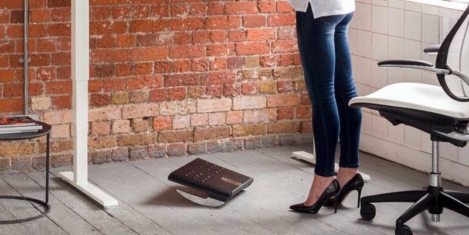To provide the best experiences, we use technologies like cookies to store and/or access device information. Consenting to these technologies will allow us to process data such as browsing behaviour or unique IDs on this site. Not consenting or withdrawing consent, may adversely affect certain features and functions.
The technical storage or access is strictly necessary for the legitimate purpose of enabling the use of a specific service explicitly requested by the subscriber or user, or for the sole purpose of carrying out the transmission of a communication over an electronic communications network.
The technical storage or access is necessary for the legitimate purpose of storing preferences that are not requested by the subscriber or user.
The technical storage or access that is used exclusively for statistical purposes.
The technical storage or access that is used exclusively for anonymous statistical purposes. Without a subpoena, voluntary compliance on the part of your Internet Service Provider, or additional records from a third party, information stored or retrieved for this purpose alone cannot usually be used to identify you.
The technical storage or access is required to create user profiles to send advertising, or to track the user on a website or across several websites for similar marketing purposes.
 Longer working lives have become a reality for millions, yet a significant number of older workers feel unsupported in the workplace, according to new findings from Aviva which claim to highlight the need for UK businesses to boost support for their older workforce. Almost two thirds (63 percent) of the 10.2 million over-50s in work – equivalent to 6.4 million people – are planning to retire later than they thought they would 10 years ago. Many of them are extending their working lives due to the rising cost of living (40 percent) and insufficient pension savings (38 percent).
Longer working lives have become a reality for millions, yet a significant number of older workers feel unsupported in the workplace, according to new findings from Aviva which claim to highlight the need for UK businesses to boost support for their older workforce. Almost two thirds (63 percent) of the 10.2 million over-50s in work – equivalent to 6.4 million people – are planning to retire later than they thought they would 10 years ago. Many of them are extending their working lives due to the rising cost of living (40 percent) and insufficient pension savings (38 percent).












 Sexual harassment in the workplace is widespread and commonplace, with unwanted sexual behaviours such as sexual comments, touching, groping and assault seen as an everyday occurrence and part of the culture in workplaces, and the Government, regulators and employers are failing in their responsibilities to tackle the problem says an influential group of MPs. Employers and regulators have ignored their responsibilities for too long, found the Women and Equalities Committee following a wide-ranging six-month inquiry and often legal protections are not available to workers in practice. The Committee found that despite 40 percent of women and 18 percent of men having experienced unwanted sexual behaviour in the workplace there has been a failure to tackle unlawful behaviours, despite the Government’s obligations under international law. The report calls on Government to focus on five priorities to put sexual harassment at the top of the agenda for employers.
Sexual harassment in the workplace is widespread and commonplace, with unwanted sexual behaviours such as sexual comments, touching, groping and assault seen as an everyday occurrence and part of the culture in workplaces, and the Government, regulators and employers are failing in their responsibilities to tackle the problem says an influential group of MPs. Employers and regulators have ignored their responsibilities for too long, found the Women and Equalities Committee following a wide-ranging six-month inquiry and often legal protections are not available to workers in practice. The Committee found that despite 40 percent of women and 18 percent of men having experienced unwanted sexual behaviour in the workplace there has been a failure to tackle unlawful behaviours, despite the Government’s obligations under international law. The report calls on Government to focus on five priorities to put sexual harassment at the top of the agenda for employers.




 Improved living standards, deflating pension pots and legal protection against age discrimination have all helped to nudge up the retirement age. The result is that for the first time since the Industrial Revolution five generations of employees are now working side by side. According to a new survey, two thirds of organisations (66 per cent) say that an age diverse workforce helped the company to have a more comprehensive skillset and knowledge base and more than seven in ten (71 per cent) felt that a multi-generational workforce brought contrasting views to their organisation. However, in the YouGov survey of middle market businesses commissioned by RSM, four in ten companies (41 per cent) said that a multi-generational workforce also increased the risk of conflict in the workplace.
Improved living standards, deflating pension pots and legal protection against age discrimination have all helped to nudge up the retirement age. The result is that for the first time since the Industrial Revolution five generations of employees are now working side by side. According to a new survey, two thirds of organisations (66 per cent) say that an age diverse workforce helped the company to have a more comprehensive skillset and knowledge base and more than seven in ten (71 per cent) felt that a multi-generational workforce brought contrasting views to their organisation. However, in the YouGov survey of middle market businesses commissioned by RSM, four in ten companies (41 per cent) said that a multi-generational workforce also increased the risk of conflict in the workplace. 














August 15, 2018
The global problem of overwork and the right to disconnect
by Aki Stamatis • Comment, Flexible working, Technology, Wellbeing
Anybody who doubts the importance of work and working culture to people’s lives should look at the resistance to President Macron’s mooted changes to labour laws. His attempts to modernise and liberalise French workplace legislation marked the first cracks in his reputation and brought millions of French workers to the streets as part of a national strike.However, one change to French legislation that met with little or no resistance earlier this year was a new right to avoid work emails outside working hours. Under the legislation, firms with more than 50 workers will be obliged to draw up a charter of good conduct, setting out the hours when staff are not supposed to send or respond to emails as they seek a right to disconnect.
(more…)